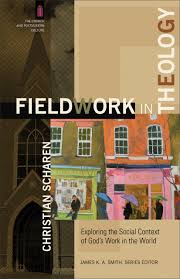 I hope you appreciated our last post, even if the books I reviewed were fairly scholarly works of somewhat unusual theology. Christopher Scharen’s new contribution to the on-going “The Church in Postmodern Culture” series (edited by James K.A. Smith) is a study of philosophers and social science theorists that inform his interest in spiritual ethnography and a theology of fieldwork that yields deep understanding of the human condition and the work of God in the world. Timothy Luke Johnson wrote a dense but moving reflection about how being comprised of skin and bone informs the theology we do; The Revelatory Body is less a theology of the body and more an embodied theology. I also was glad to
I hope you appreciated our last post, even if the books I reviewed were fairly scholarly works of somewhat unusual theology. Christopher Scharen’s new contribution to the on-going “The Church in Postmodern Culture” series (edited by James K.A. Smith) is a study of philosophers and social science theorists that inform his interest in spiritual ethnography and a theology of fieldwork that yields deep understanding of the human condition and the work of God in the world. Timothy Luke Johnson wrote a dense but moving reflection about how being comprised of skin and bone informs the theology we do; The Revelatory Body is less a theology of the body and more an embodied theology. I also was glad to 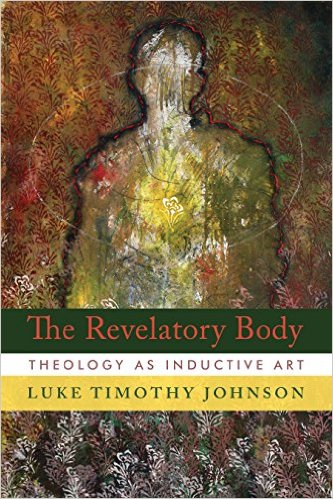 announce Darryl Guder’s new work in the “Gospel and our Culture Network” series, Called to Witness: Doing Missional Theology which moves from a Theology of Mission to Missional Theology. All three of these reviewed books presume that something about our setting, our context, our very creatureliness matters, even for the methodology of doing theology. That’s a heady notion, but these writers tease it out in their work, and we wanted to be sure you knew we had these sorts of resources. These are examples of creative, applied theology for serious thinkers who want to learn, but we trust will yield fruit in deeper faith and wiser Christian living.
announce Darryl Guder’s new work in the “Gospel and our Culture Network” series, Called to Witness: Doing Missional Theology which moves from a Theology of Mission to Missional Theology. All three of these reviewed books presume that something about our setting, our context, our very creatureliness matters, even for the methodology of doing theology. That’s a heady notion, but these writers tease it out in their work, and we wanted to be sure you knew we had these sorts of resources. These are examples of creative, applied theology for serious thinkers who want to learn, but we trust will yield fruit in deeper faith and wiser Christian living.
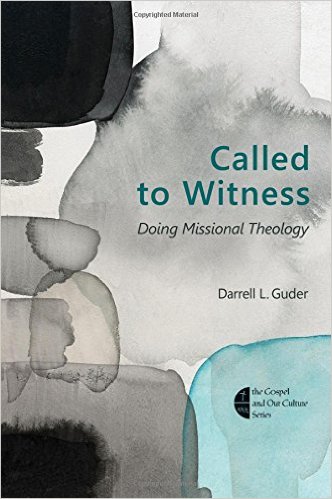 But that got me thinking, not just about the value of those books but also of the large theology section we have here at the shop. From liberal to conservative, historic to contemporary, Puritan to Pentecostal, Girardian to Barthian to neo-Calvinist, from the Nicene Fathers to Aquinas and Luther and Edwards, from Walter Wink to R.C. Sproul to Gabe Fackre to Rowan Williams, we really do have a wild range of stuff, older and newer, reliable and experimental, written by women and men of many denominations.
But that got me thinking, not just about the value of those books but also of the large theology section we have here at the shop. From liberal to conservative, historic to contemporary, Puritan to Pentecostal, Girardian to Barthian to neo-Calvinist, from the Nicene Fathers to Aquinas and Luther and Edwards, from Walter Wink to R.C. Sproul to Gabe Fackre to Rowan Williams, we really do have a wild range of stuff, older and newer, reliable and experimental, written by women and men of many denominations.
I was serious, too, when I offered to suggest some basic primers on theology for those who have not read any serious text that systematically explores the basic doctrines of the faith. Unless you are the type that crosses her fingers when reciting the creeds (or don’t use any creeds at all) you really should have a basic, standard, introduction to doctrine on your shelves. Give a shout if we can help and we’ll help find one good for you.
But, as I say, this got me pondering what else I coulda, shoulda, woulda listed in that already-lengthy reflection of those brand new theology books.
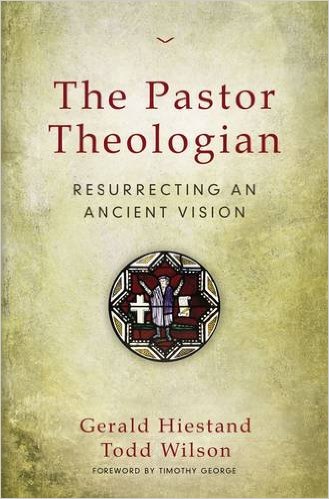
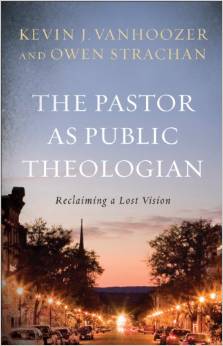 And, if the two fabulous ones I led off with – The Pastor as Public Theologian: Reclaiming a Lost Vision by Kevin Vanhoozer & Owen Strachan and The Pastor-Theologian: Resurrecting an Ancient Vision by Gerald Hiestand & Todd Wilson — are even partially right in insisting on the importance for Christian churches of theological discourse (as they both surely are) many of our congregations have some catching up to do. Some of our pastors may have some catching-up to do, if they have not exercised their theological muscles much since seminary classes. Maybe you should gift them with one of these books as a way to share your appreciation for this part of their call.
And, if the two fabulous ones I led off with – The Pastor as Public Theologian: Reclaiming a Lost Vision by Kevin Vanhoozer & Owen Strachan and The Pastor-Theologian: Resurrecting an Ancient Vision by Gerald Hiestand & Todd Wilson — are even partially right in insisting on the importance for Christian churches of theological discourse (as they both surely are) many of our congregations have some catching up to do. Some of our pastors may have some catching-up to do, if they have not exercised their theological muscles much since seminary classes. Maybe you should gift them with one of these books as a way to share your appreciation for this part of their call.
In a way, I was hinting at this also at the end of the BookNotes list a week ago where I tried to sell the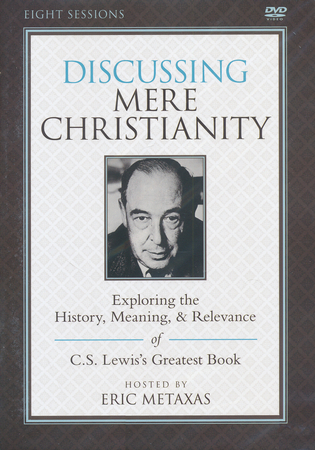 Discussing Mere Christianity DVD curriculum. I can hardly think of a church that wouldn’t benefit from using a study like that, affirming what we most merely believe and why.
Discussing Mere Christianity DVD curriculum. I can hardly think of a church that wouldn’t benefit from using a study like that, affirming what we most merely believe and why.
Learning matters, and theology matters. As a book lover, I’m sure you agree.
Anyway, here’s a rather rambling coda to that intentional and careful post about modern theological studies, naming some random stuff that for one reason or another, came to mind after I hit send. Enjoy.
And send us an order if you can. Click on the link below and we’ll take care of your order with a prayer and a smile.
I COULD HAVE STARTED WITH SOMETHING DIALOGICAL, CLASSY, SOLID
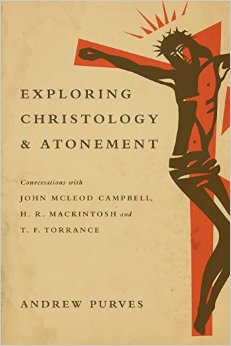 Exploring Christology & Atonement: Conversations with John McLeod Campbell, H.R. Mackintosh, and T.F. Torrance Andrew Purves (IVP Academic) $30.00 Purvis is a hero of many mainline and evangelical Presbyterians who have studied under him at Pittsburgh Theological Seminary, or who have read his wonderful, pastoral works such as The Crucifixion of Ministry and The Resurrection of Ministry. His specialty, as somewhat of a Scottish Barthian, I suppose, is historical theology, and in this book – which has been called “groundbreaking” and a “fine feast” — Andrew explores how some very heavy-weight, incredibly important Scottish theologians of an earlier (but still modern) era wrote about these essential topics, Christ and his cross. I think if one is fairly conservative on these matters, you will be stretched and blessed to walk into these profound topics (the Trinity, the nature of atonement, justification and such) in conversation with these older theologians from the British Isles, with Purves as your guide. And if you are not inclined to appreciate classic formulations, I dare you to not enjoy this fascinating guide into these old thinkers.
Exploring Christology & Atonement: Conversations with John McLeod Campbell, H.R. Mackintosh, and T.F. Torrance Andrew Purves (IVP Academic) $30.00 Purvis is a hero of many mainline and evangelical Presbyterians who have studied under him at Pittsburgh Theological Seminary, or who have read his wonderful, pastoral works such as The Crucifixion of Ministry and The Resurrection of Ministry. His specialty, as somewhat of a Scottish Barthian, I suppose, is historical theology, and in this book – which has been called “groundbreaking” and a “fine feast” — Andrew explores how some very heavy-weight, incredibly important Scottish theologians of an earlier (but still modern) era wrote about these essential topics, Christ and his cross. I think if one is fairly conservative on these matters, you will be stretched and blessed to walk into these profound topics (the Trinity, the nature of atonement, justification and such) in conversation with these older theologians from the British Isles, with Purves as your guide. And if you are not inclined to appreciate classic formulations, I dare you to not enjoy this fascinating guide into these old thinkers.
The raves are notable, mostly from mainline denominational locations. Michael Jinkins of Louisville Presbyterian Theological Seminary says (in a stunning assertion) “Arguably no other theologians have provided more profound insights into the life and work of Christ and the nature of the atonement…” and David Fergusson of University of Edinburgh calls the scholars under consideration “illustrious” noting that their work as explained and appropriated by Purvis serves “both as a corrective to some distortions within the Reformed tradition and also as a recovery of key Scriptural and ecumenical insights.” Leanne Van Dyk, now President of Columbia Theological Seminary in Georgia, affirms the significance of this dialogical method – three Scottish theologians in conversation with each other, adjudicated by a Pittsburgh Presbyterian — and then says,
Even more, Purvis makes vividly clear the urgency and gift of theology for the sake of the church. Readers will encounter in this book a vision of deep faithfulness to the gospel. A fine feast, indeed.
I COULD HAVE SUGGESTED A BRAND NEW BOOK BY ONE OF THE MOST FAMOUS THEOLOGIANS WORKING TODAY
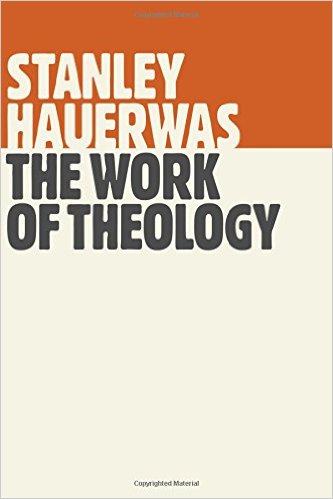 The Work of Theology Stanley Hauerwas (Eerdmans) $28.00 I suppose I don’t have to explain how extraordinarily important Hauerwas is; he has written academic monographs, scholarly works and popular screeds, his colorful seminars and sermons have inspired many (and turned off some, too.) His wide reading and fluency in philosophy and exceedingly fertile mind makes him truly an exceptional scholar. Library Journal wrote that “it is hard to imagine any living theologian more celebrated than Hauerwas” and The Christian Century says that the church needs him, because “His theology is courageous, challenging, and a source of hope when many ecclesial leaders seem to be despairing.” Commonweal writes, “Hauerwas has achieved singular preeminence among theologians in the United States and as a public intellectual…any new book bearing his name is noteworthy.” I should remind you that he has written a fascinating memoir Hannah’s Child: A Theologians Memoir. In this new book he revisits and restates many of his earliest concerns. He thinks he and his work have been mischaracterized and misunderstood and here he wants to use “practical reason” to offer theological reflection and a bit of clarification.
The Work of Theology Stanley Hauerwas (Eerdmans) $28.00 I suppose I don’t have to explain how extraordinarily important Hauerwas is; he has written academic monographs, scholarly works and popular screeds, his colorful seminars and sermons have inspired many (and turned off some, too.) His wide reading and fluency in philosophy and exceedingly fertile mind makes him truly an exceptional scholar. Library Journal wrote that “it is hard to imagine any living theologian more celebrated than Hauerwas” and The Christian Century says that the church needs him, because “His theology is courageous, challenging, and a source of hope when many ecclesial leaders seem to be despairing.” Commonweal writes, “Hauerwas has achieved singular preeminence among theologians in the United States and as a public intellectual…any new book bearing his name is noteworthy.” I should remind you that he has written a fascinating memoir Hannah’s Child: A Theologians Memoir. In this new book he revisits and restates many of his earliest concerns. He thinks he and his work have been mischaracterized and misunderstood and here he wants to use “practical reason” to offer theological reflection and a bit of clarification.
In a way, The Work of Theology is the kind of book we have not seen from him in a while, and it may become the “go to” introduction to his impressive output. Some of his essays seem so very interesting and valuable – “How I Think I Learned to Think Theologically” and “How to Do or Not Do Protestant Ethics” and “How to Write a Theological Sentence” are musts – and don’t miss “How to Be Theologically Funny.” The last chapter is “How (Not) to Retire Theologically.” Can you see this isn’t a simply “how to” guide, but a more foundational survey of learning to think theologically, not a “greatest hits” album, but certainly a summarizing, clarifying, foundational collection. One chapter tries to offer ideas about how the Holy Spirit works, another studies the role of irony. I think one taking up the calling of being a “Pastor-Theologian” will be interested in “The ‘How’ of Theology and the Ministry.” For what it is worth, there’s a long final chapter – again, getting at this question of whether people “get” him or not or have read him properly – which is his response to the recently published Hauerwas: A (Very) Critical Introduction which was written by Nicholas Healy. That is a very illuminating piece, the chapter I read first. Maybe you could too.
I COULD HAVE STARTED WITH THESE TWO VERY SMALL BUT WONDERFUL INTRODUCTIONS

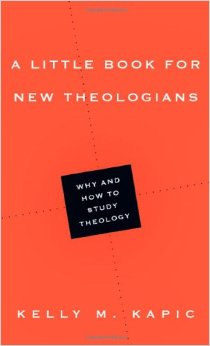 A Little Book for New Theologians: Why and How to Study Theology Kelly M. Kapic (IVP Academic) $8.00 If the above-mentioned Ford is a high church, British Anglican, Kapic – whose PhD is from the King’s College at the University of London) is a conservative, Reformed scholar. He is one of the great thinkers within evangelical scholarship and a much-respected teacher and mentor. This is a wonderful primer to the task, about the “why and how” of doing this kind of reading. As Sinclair Ferguson writes, “To study with Kelly Kapic must be serious fun… an ideal start kit for beginning theology student and an affection-refresher for those who have been longer on the way.” Hmmm – this little meditation on how to do theological thinking can “refresh” one’s “affection.” Don’t you want to try it and see if it is true?
A Little Book for New Theologians: Why and How to Study Theology Kelly M. Kapic (IVP Academic) $8.00 If the above-mentioned Ford is a high church, British Anglican, Kapic – whose PhD is from the King’s College at the University of London) is a conservative, Reformed scholar. He is one of the great thinkers within evangelical scholarship and a much-respected teacher and mentor. This is a wonderful primer to the task, about the “why and how” of doing this kind of reading. As Sinclair Ferguson writes, “To study with Kelly Kapic must be serious fun… an ideal start kit for beginning theology student and an affection-refresher for those who have been longer on the way.” Hmmm – this little meditation on how to do theological thinking can “refresh” one’s “affection.” Don’t you want to try it and see if it is true?
I COULD HAVE MENTIONED SOMETHING THAT IS VERY ENERGETIC, PROVOCATIVE AND ICONOCLASTIC
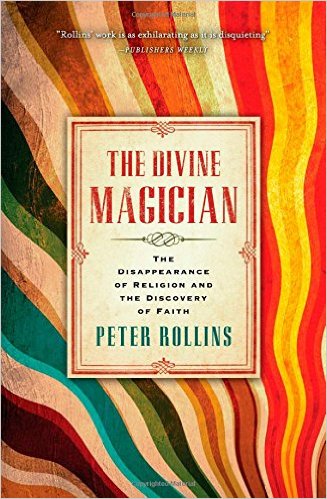 The Divine Magician: The Disappearance of Religion and the Discovery of Faith Peter Rollins (Howard/Simon & Schuster) $14.99 I am not immediately drawn to books which claim to be “a bold and subversive vision of faith on the front line of theological innovation” but I know that many people, including some friends that I respect and like, find sustenance from the writings of Rollins. (His first is called How (Not) To Speak of God, a recent one is called The Idolatry of God.) He is a widely sought-after storyteller and public speaker that integrates live song and liturgy, poetry and preaching, performance art and sonic landscapes into his programs as he deconstructs standard notions of abstract dogma and reasonable faith, pushing participants to, as one book title puts it, Insurrection, where “to believe is human, to doubt, divine.) I want to like his iconoclastic protest and prophecy but I admit to not even understanding many of his obtuse books. I suppose it just isn’t my cup of disco. Here is what it says on the back: “By approaching Christianity as a type of magic trick, firebrand Peter Rollins presents an understanding of faith that is both unorthodox and challenging.” I appreciate that he argues for a deeply material faith which finds meaning not simply in a set of beliefs but in a passionate commitment to the world. Is it “incendiary” as he suggests? Does it “offer hope for those seeking a depth and density in life?” Try it and see. Join with others to read, pray and talk, study and search. Maybe he’s on to something. This much is true: we need deep consideration of these important matters, and if thoughtful folks together work through these kinds of edgy resources it can help clarify what they do and don’t believe, and how to proceed. It ain’t magic, but the process can be wondrous.
The Divine Magician: The Disappearance of Religion and the Discovery of Faith Peter Rollins (Howard/Simon & Schuster) $14.99 I am not immediately drawn to books which claim to be “a bold and subversive vision of faith on the front line of theological innovation” but I know that many people, including some friends that I respect and like, find sustenance from the writings of Rollins. (His first is called How (Not) To Speak of God, a recent one is called The Idolatry of God.) He is a widely sought-after storyteller and public speaker that integrates live song and liturgy, poetry and preaching, performance art and sonic landscapes into his programs as he deconstructs standard notions of abstract dogma and reasonable faith, pushing participants to, as one book title puts it, Insurrection, where “to believe is human, to doubt, divine.) I want to like his iconoclastic protest and prophecy but I admit to not even understanding many of his obtuse books. I suppose it just isn’t my cup of disco. Here is what it says on the back: “By approaching Christianity as a type of magic trick, firebrand Peter Rollins presents an understanding of faith that is both unorthodox and challenging.” I appreciate that he argues for a deeply material faith which finds meaning not simply in a set of beliefs but in a passionate commitment to the world. Is it “incendiary” as he suggests? Does it “offer hope for those seeking a depth and density in life?” Try it and see. Join with others to read, pray and talk, study and search. Maybe he’s on to something. This much is true: we need deep consideration of these important matters, and if thoughtful folks together work through these kinds of edgy resources it can help clarify what they do and don’t believe, and how to proceed. It ain’t magic, but the process can be wondrous.
MAYBE I SHOULD HAVE SOUNDED THE ECUMENICAL CALL TO INTRAMURAL CONVERSATION

Bryan Litfin of Moody Bible Institute writes on the back “If you have ever wondered, ‘Why in the world would someone become that type of Christian?’ this book provides the answer.” Timothy George says it is “ecumenism at its best” and Mark Noll writes that “For a subject that regularly generates considerable heat, this is a book full of the best kind of light.” The foreword is by Scot McKnight and he notes how we can be reawakened to the “reality of how many are responding to stories of migration from evangelicalism.” Fascinating, heart-felt, with considerable discussion of what approach is best.
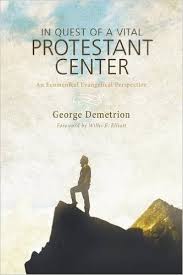 In a Quest of a Vital Protestant Center: An Ecumenical Evangelical Perspective George Demetrion (Wipf & Stock) $36.00 I have to admit I am really struck by books that draw on diverse theological views and with almost every book I always start with a study of the footnotes, and sometime unfairly, judge the author by her citations, who she or he draws upon or is in discussion with. When, as here, I see insightful use of Puritan scholar and Reformed Anglican pastor J.I. Packer and UCC Bible scholar Walter Brueggemann, I am excited and sing praise to God. It is so sad that in non-evangelical, non-Calvinist circles so few know the wise work of Packer; similarly, it is sad many evangelicals do not read the Brueggemann. I love the ecumenism and the healthy model of how to be in respectful, hopeful conversation with writers such as Douglas Hall, Richard Lints, Stanley Grenz, Os Guinness, Nancy Murphy. I loved a long review written by a UCC pastor pal of mine, Chris Anderson, in The New Mercersburg Review, noting that
In a Quest of a Vital Protestant Center: An Ecumenical Evangelical Perspective George Demetrion (Wipf & Stock) $36.00 I have to admit I am really struck by books that draw on diverse theological views and with almost every book I always start with a study of the footnotes, and sometime unfairly, judge the author by her citations, who she or he draws upon or is in discussion with. When, as here, I see insightful use of Puritan scholar and Reformed Anglican pastor J.I. Packer and UCC Bible scholar Walter Brueggemann, I am excited and sing praise to God. It is so sad that in non-evangelical, non-Calvinist circles so few know the wise work of Packer; similarly, it is sad many evangelicals do not read the Brueggemann. I love the ecumenism and the healthy model of how to be in respectful, hopeful conversation with writers such as Douglas Hall, Richard Lints, Stanley Grenz, Os Guinness, Nancy Murphy. I loved a long review written by a UCC pastor pal of mine, Chris Anderson, in The New Mercersburg Review, noting that
Superficial categories in music have not allowed Bob Dylan to join one of his heroes, Hank Williams Sr., in the Country Music Hall of Fame. George Demetrion has broken down similar walls in theology by bringing together a wise diversity of theologians in this book. Bravo.
AND DOES ANY OF THIS REALLY COUNT AS REALLY REAL KNOWING, ANYWAY?
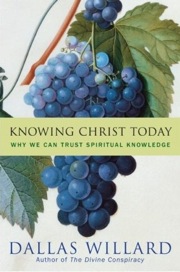 Knowing Christ Today: Why We Can Trust Spiritual Knowledge Dallas Willard (HarperOne) $15.99 I hope you have read some of the late Dallas Willard – his two newest, published after his death, include The Divine Conspiracy Continued (now out in paperback) and the amiable, very valuable book on apologetics called The Allure of Gentleness.) His work about inner transformation is mature and, if taken seriously, life-changing and transformational. (I like, by the way, what is almost an “intro to Willard” written by his good friend, John Ortberg called Soul Keeping: Caring for the Most Important Part, which is also available in a DVD curriculum.)
Knowing Christ Today: Why We Can Trust Spiritual Knowledge Dallas Willard (HarperOne) $15.99 I hope you have read some of the late Dallas Willard – his two newest, published after his death, include The Divine Conspiracy Continued (now out in paperback) and the amiable, very valuable book on apologetics called The Allure of Gentleness.) His work about inner transformation is mature and, if taken seriously, life-changing and transformational. (I like, by the way, what is almost an “intro to Willard” written by his good friend, John Ortberg called Soul Keeping: Caring for the Most Important Part, which is also available in a DVD curriculum.)
Anyway, much of the best discipleship/formation stuff presumes some of this more theoretical stuff, explored here in succinct and weighty chapters, including the question of whether faith equals knowledge. Why does God call us to know? His work here is rich and not just intellectually stimulating, it is fruitful and wise and beneficial. The late philosophy professor and spiritual guide offers good words about learning, about true knowledge, about spiritual growth, about how to communicate with those who do not embrace Christ, and even a powerful final chapter about the role of pastors as teachers (pastor-theologians?) Is there a split or dichotomy between “facts and values” and between “science and faith” (just for instance)? Is all truth God’s truth? Does the Bible reveal to us things that are deeply true and what does it mean to be sure? What do we mean when we say something is spiritually true? Can we trust this stuff that our faith calls us to? My, my, this is a topic, approached with applied theological insight, content that frankly too few of us get to, and which may hinder us until we do.
I SURELY SHOULD HAVE LISTED SOME GOOD STUDY GUIDES FOR BASIC CHRISTIAN THEOLOGICAL AWARENESS IN ORDINARY CHURCHES LIKE THIS SERIES BY ALISTER McGRATH
If you want to delve into theology just a bit, getting your toes wet in a brief, accessible read that is properly described as useful for both “study and devotion” by one of the smartest guys walking on the planet these days, no less, you should know about this “Hearts of the Christian Faith” series by Alister E. McGrath. Professor McGrath is Professor of Theology, Mission, and Education and Head of the Centre for Theology, Religion, and Culture at King’s College, London. His most recent book is a pair of significant, lively works on C.S. Lewis although he has created major academic textbooks for theology and church history and more. These handy sized paperbacks are each about 115 pages, nicely done, and would be great for personal reading, to use in small groups or Adult Education classes. Each has 5 chapters. It is a shame that they don’t have discussion questions.
The Living God: A Guide for Study and Devotion Alister E. McGrath (WJK) $16.00
Jesus Christ: A Guide for Study and Devotion Alister E. McGrath (WJK) $16.00
The Spirit of Grace: A Guide for Study and Devotion Alister E. McGrath (WJK) $16.00
Faith and Creeds: A Guide for Study and Devotion Alister E. McGrath (WJK) $16.00
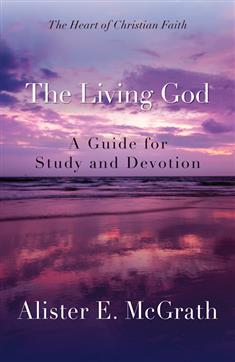
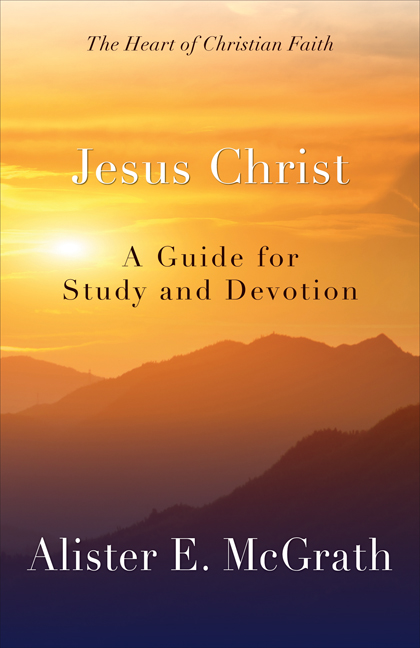
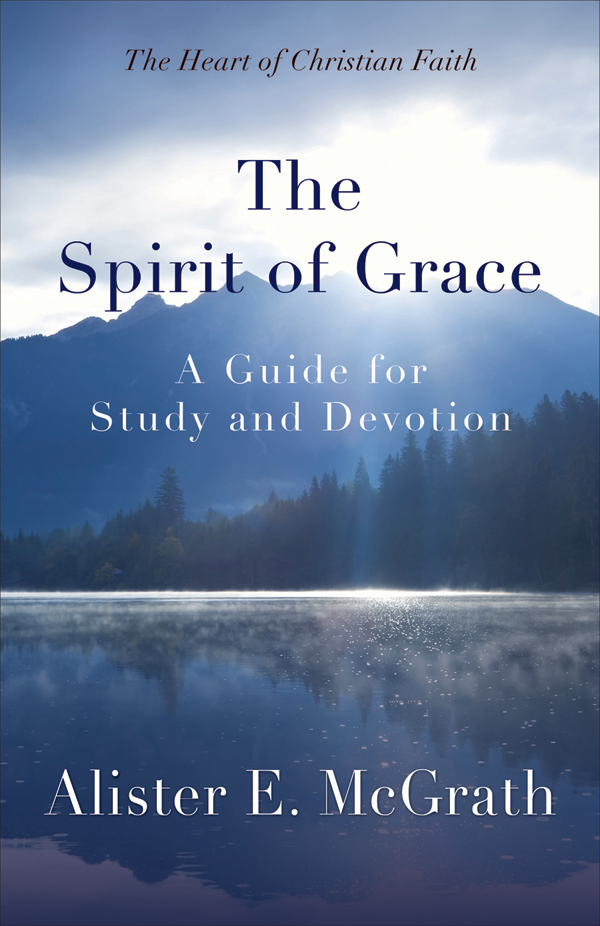
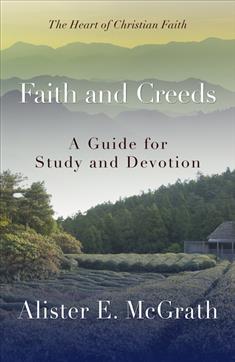
A FINAL SUGGESTION: COMPARE AND CONTRAST, WATCH OUT FOR BLIND SPOTS, AND MODEL BOTH/AND AS DOES THIS HELPFUL BOOK EXPLORING “THE EXPLICIT GOSPEL”
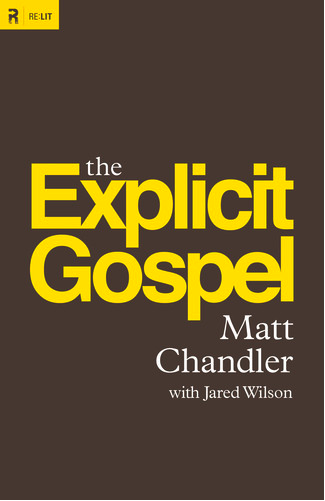 The Explicit Gospel Matt Chandler with Jared Wilson (Crossway) $14.99 Oh my, I wish I had time and energy to explain the many fine features of this wise and inspiring book. It speaks to matters that are I think are among the most urgent of our time, and even if Chandler and Wilson don’t get everything exactly as I might wish, they come pretty close. There is more (much more) to talk about than in this book, but this book gets at something that will useful for many Hearts & Minds readers, I think. And it is mostly a generous and fair-minded polemic, which is nice to see these days.
The Explicit Gospel Matt Chandler with Jared Wilson (Crossway) $14.99 Oh my, I wish I had time and energy to explain the many fine features of this wise and inspiring book. It speaks to matters that are I think are among the most urgent of our time, and even if Chandler and Wilson don’t get everything exactly as I might wish, they come pretty close. There is more (much more) to talk about than in this book, but this book gets at something that will useful for many Hearts & Minds readers, I think. And it is mostly a generous and fair-minded polemic, which is nice to see these days.
Even if their Gospel Coaltion/Acts 29 Reformed passion isn’t your own faith tradition, and you don’t resonate with this inter-mural debate within conservative evangelical Reformed-ish folks, I think their case study will prove helpful for everyone from mainline folks to emerging post-evangelicals to Biblical students of varying traditions.
Here’s the short version.
Some folks tend to approach the gospel informed by intellectual concepts drawn from what is called systematic theology: you know, basic Christian ideas like the nature of God, human sin, forgiveness and grace, Jesus and the cross. These concepts help us realize the great need we have for grace, and helps assure us of God’s character, Christ redeeming work, and an assurance of salvation. This is the way many people (liberal or conservative) tend to approach faith, by way of appropriating what they think the Bible says about these more-or-less random topics. If we get the right formulation to these profound questions, we can make a case for Christ, and see the glory of the gospel. God loves us, Jesus died for us, we can be forgiven and called into new life. You know.
Another way that is increasingly used to make the gospel explicit is not to start with these systematic categories of doctrine, but to read the Bible (and draw theology from it) as it comes to us, that is, as a story. Narrative theology starts not with the “Romans road” of St. Paul, but with the meaning of the human vocation based on the goodness of creation, but then realizes the tragedy of our brokenness and alienation, sees God’s overtures in history – promises, laws, judges, kings, wars, laments, poems, prophets, hopes, dreams, promises, again — and eventually gets to the plot point of what Lewis and Tolkien called a eucatastrophe, a good tragedy, understood as a major act in the play, the redemption wrought by Christ’s incarnation, work, death, and resurrection as the plot continues towards a final reconciling of all things and promised restoration of a renewed creation. Is this grand story (Frederick Buechner once asked) best understood as a classic comedy, a fairy tale, or a tragedy? Maybe all three, but the point is that Chandler explains the strength of this narrative approach about the story of creation/fall/redemption/restoration which is less systematic, but informed by the very contours and plot of the Bible itself.
The first ways helps us at least realize our own personal salvation, and the good news is applied to our own salvation by faith alone, through Christ alone. It doesn’t talk about the Kingdom of God much, but at least it brings home the essence of faith in Jesus and God’s grace. The second way, also Christ-centered, sees the gospel best understood as the outgrowth of the dramatic unfolding story of Israel as told in the drama of Scripture, and applied to the cosmos itself, as the Bible itself describes it, albeit in a curious plot and complex, multi-generational drama. If the first is a bit personalistic, the other may be a bit social and corporate. The first certainly invites evangelism while the second says “all of life redeemed” so authorizes cultural engagement. In the view of Pastor Chandler, something is gained in each telling of the story, each way to make the gospel explicit. And something is lost a bit if we overemphasize one approach to the exclusion of the other.
This is not exactly the same ground as the conflict of the previous century that set up evangelical revivalism and conservative faith as a response to a liberalized social gospel and the subsequent dead-end binary of words versus deeds, evangelism versus social action. No, because in the telling of Chandler, both ways of telling the story — via systematic theology or via Biblical theology — can be utterly orthodox and fully Biblical and genuinely helpful, so these offer two ways of being true to the texts and the best theological traditions, not a liberal versus conservative debate.
The Explicit Gospel does seems to offer a way of seeing the task of theology (helping us understand and express the gospel) and significance of getting it right. I like how he offers the strengths (and weaknesses) of each particular perspective, warns about the blinds spots of each emphasis and honors the good intentions of each.
Maybe this doesn’t make sense to you, but it really seems to me to be one of the more helpful theological conversations going on these days. I might wish for a resolution just a little different then this Texas pastor offers, but this is nonetheless a good resource to get your own thinking going, and to shape the conversation in your own church, parish, or fellowship group. Kudos.
BookNotes
DISCOUNT
ANY ITEM MENTIONED
20% off
order here
takes you to the secure Hearts & Minds order form page
just tell us what you want
inquire here
if you have questions or need more information
just ask us what you want to know
Hearts & Minds 234 East Main Street Dallastown, PA 17313 717-246-333
